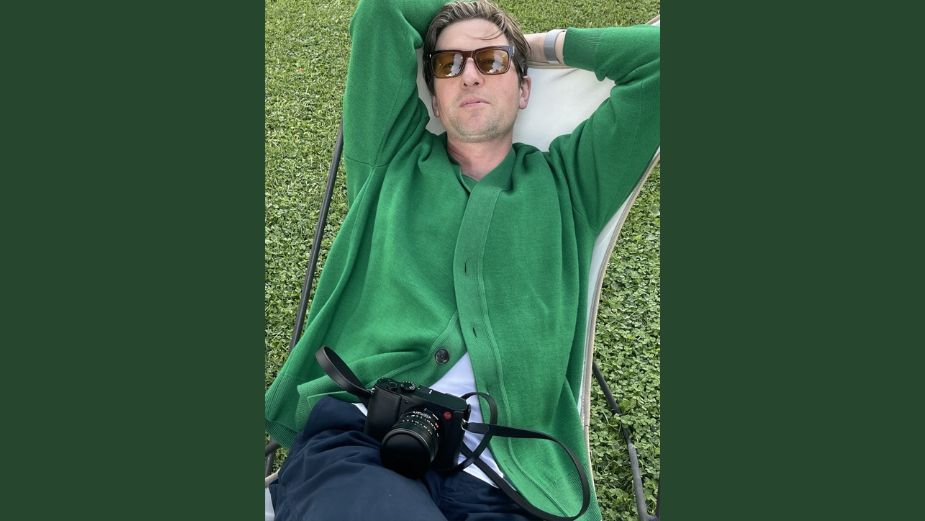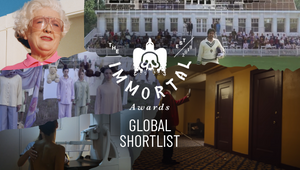
The Directors: Uncle Friendly

Uncle Friendly is the moniker for director, writer and sometimes stuntman Rhett Wade-Ferrell. Rhett grew up during the 80s, far from civilization, in a Tasmanian wilderness survival camp for kids. With a burning curiosity for the world outside the trenches of his father’s survivalist utopia, Rhett traded his Swiss Army knife for a VHS copy of Eraserhead and moved to the city.
Rhett’s film education came from watching movies, making DIY music videos through his collective Moop Jaw and working as an extremely underqualified producer’s assistant for a Korean production company. After three years in New York shaking hands, making more music videos, and directing docustories around the world for IBM, Rhett returned to Australia to launch a commercial career under Uncle Friendly.
Name: Uncle Friendly (Rhett Wade-Ferrell)
Location: Sydney, Australia
Repped by/in: AIRBAG - Australia, MindsEye - UK, Interrogate - USA, Gang Films - France
Awards: Play NZ: Spikes - Grand Prix, Gold, Silver, Bronze; D&AD - Graphite, Wood; Shots - Gold; LIA - Silver 2x Bronze; OneShow - Silver; AWARD - Gold, 3x Silver, Bronze. AAMI ‘AAMI Bargain Regret’, AAMI ‘AAMI Does – Businesses Like Yours’, AAMI ‘AAMI Does – Cover for the Challenges of the Everyday Arena’ - Winner: Campaign Brief ‘The Work’.
LBB> What elements of a script sets one apart from the other and what sort of scripts get you excited to shoot them?
Uncle Friendly> On the first read I actually get excited by most scripts. I read it and imagine it through my lens, which obviously is tailored to my personal tastes. Then, on the second read, I start to grab on to parts that would be fun because of a technique or a character trait or some piece of art direction. Then I throw all of that out the window and try and get my head into what the actual idea and communication is.
LBB> How do you approach creating a treatment for a spot?
Uncle Friendly> I’ve been writing treatments for around 17 years now and it took me 15 years to work out the best way for me - and it’s incredibly simple. What is the communication? What is the core idea? When you have that, and can state it in a few words, I’m ready to reinterpret the script. I used to write and rewrite so much that I’d go around in circles. Now I start with the script and work out what could be better to help the story communicate the idea as tightly as possible. After I have the script done I can write the supporting sections in about an hour.
LBB> If the script is for a brand that you're not familiar with/don’t have a big affinity with or a market you're new to, how important is it for you to do research and understand that strategic and contextual side of the ad? If it’s important to you, how do you do it?
Uncle Friendly> I don’t research at all. I find that if a script excites me I’ll be more creative if I don’t see any imagery of anything else they’ve done. If I look at their other work it throws me. If there’s something important I should know that usually comes out in the agency briefing.
LBB> For you, what is the most important working relationship for a director to have with another person in making an ad? And why?
Uncle Friendly> Every single relationship is the most important relationship and I treat everyone the same. I maybe kiss the coffee guy’s butt more than the client, but who doesn’t.
LBB> What type of work are you most passionate about - is there a particular genre or subject matter or style you are most drawn to?
Uncle Friendly> The most important thing for me, always, is character and story.
LBB> What misconception about you or your work do you most often encounter and why is it wrong?
Uncle Friendly> People assume I can dance. I can’t.
LBB> Have you ever worked with a cost consultant and if so how have your experiences been?
Uncle Friendly> I work with them on every job. They’re called producers and they’re essential to me not bankrupting the production company!
LBB> What’s the craziest problem you’ve come across in the course of a production – and how did you solve it?
Uncle Friendly> I feel like every job has a central crazy production problem, but I can’t take the credit for them. I shot a music video for Genesis Owusu recently, and I hadn’t done a music video for about 6 years. You quickly remember how a lack of budget attracts a lot more problems to solve. The whole video was based around Genesis being trapped in this house trying to kill a cockroach, and, while we had planned to build the roach in VFX, we had this one shot where Genesis traps the roach in a glass. There was going to be a lot of interaction between the glass and the roach and we didn’t have the time or the money to do that shot with VFX - but being the genius that I am I decided that we should just catch a live roach and do it for real. Living in Sydney how hard can it be right? They’re everywhere.
But for some reason in the week leading up to the shoot all the roaches in Sydney vanished, and none of our head of departments saw a single roach. We had these little ones from the pet store, but they’re intended as food for snakes and lizards, and look completely different. So, it’s 5am on the morning of the shoot, and the label’s creative director Ady Neshoda and production designer Imogen Walsh and I are texting, and no one’s had any luck. We’re literally screwed, so I put down my phone and pressed the button on my coffee machine - and this big beautiful German cockroach wanders out of the back of the machine, up the wall, and stops right in front of my face. I’m already holding a latte glass, so I go ‘plop’ – and just like that he got the job.
LBB> How do you strike the balance between being open/collaborative with the agency and brand/client while also protecting the idea?
Uncle Friendly> Everyone wants to be heard, and it’s important - as the director - to make sure that everyone from the agency producer to the client feels like they have a voice and you are listening to them. It took me a long time to figure that out. The best thing I can do is win the job and then protect the idea from everyone it touches - including myself. If you have a clear direction on what the core of the idea is, and how that relates to the approach that was at the centre of your treatment, it’s pretty easy to shepherd everyone along in the right direction. The only time that doesn’t work is when you change your mind on something fundamental - but as long as you’ve thought it through and you can articulate the change and why, it works out just fine.
LBB> What are your thoughts on opening up the production world to a more diverse pool of talent? Are you open to mentoring and apprenticeships on set?
Uncle Friendly> I think mentoring is the best way to even the playing field. It’s a white, middle class male dominated industry and it’s changing, but it takes time. One of the hardest things about breaking into the film industry is breaking into the film industry, and if you don’t have anyone in your family that is connected to it it’s very difficult to get an opportunity to prove yourself. I’d be happy to take anyone under my wing who wants an opportunity to come and see how it works, and do what I can to help them.
LBB> How do you feel the pandemic is going to influence the way you work in the longer term? Have you picked up new habits that you feel will stick around for a long time?
Uncle Friendly> I actually love Zoom. I can share my screen, and anyone else can do the same. To me, this is a very focused way to walk through documents, and I don’t have to waste hours in Ubers travelling to and from meetings. I have also been doing a lot of post production this way, and that works very well too. The one thing I hate is that I’m paranoid about getting sick most of the time. If I get Covid, I can’t go to set, and have to rely on a backup director, which is stressful. But I’m also very lucky to have a job where I can work on Zoom, it’s not like that for a lot of people out there, so I’m very grateful.
LBB> Your work is now presented in so many different formats - to what extent do you keep each in mind while you're working (and, equally, to what degree is it possible to do so)?
Uncle Friendly> What I like most is when you aren’t simply making one piece of content to live in all formats, I love it when we can do little spin offs for Instagram. I used to love seeing ads I directed in the cinema but now I mostly see them on Instagram, and to be honest they look pretty great that small.
LBB> What’s your relationship with new technology and, if at all, how do you incorporate future-facing tech into your work (e.g. virtual production, interactive storytelling, AI/data-driven visuals etc)?
Uncle Friendly> I don’t know what any of those things are. I just take it one film at a time and the tools appear according to the problems we are trying to solve. There’s the David Fincher approach of knowing every piece of gear and how you can use it to second guess the crew and not be at the mercy of their laziness or corner cutting, but I don’t work like that. I trust the people around me who are all the best people at what they do, and if they believe in the idea they’ll get the right tools in front of me.
LBB> Which pieces of work do you feel really show off what you do best – and why? (Please upload 4 videos to your company archive).
Uncle Friendly> Play NZ via TBWA - Sydney was a chaotic crash course in what you can do when you just go for it, even when you don’t have the money to go all out. In the end, a great idea is all you need.
The Genesis Owusu ‘GTFO’ video is a great example of how I can break out of playful, colourful work, and dig into something much grimier.
The ‘Small Business’ campaign I did for AAMI via Ogilvy - Melbourne was a really fun one. The original script was everyday vignettes in small businesses with a voiceover calling out statistics of the numbers of businesses AAMI cover. I pitched it back to them as a one-shot set piece paying homage to the train sequence from Wes Anderson’s ‘Darjeeling Limited’ - complete with the voiceover becoming the final small business owner. It was also the first AAMI campaign to not resolve with the traditional end frame. It was amazing to be on set with the client, see how it worked on set, and literally have them buy that idea on the spot. The building of trust with the creatives at Ogilvy and the AAMI client made that piece of work what it is. That and the production design mastery of Steven Jones-Evans!
The Xero spots I did for Tradie and Salon show how I can bring a music video palette and concept and blend it with more traditional advertising. Poppy aesthetics with nice character moments and choreography.












